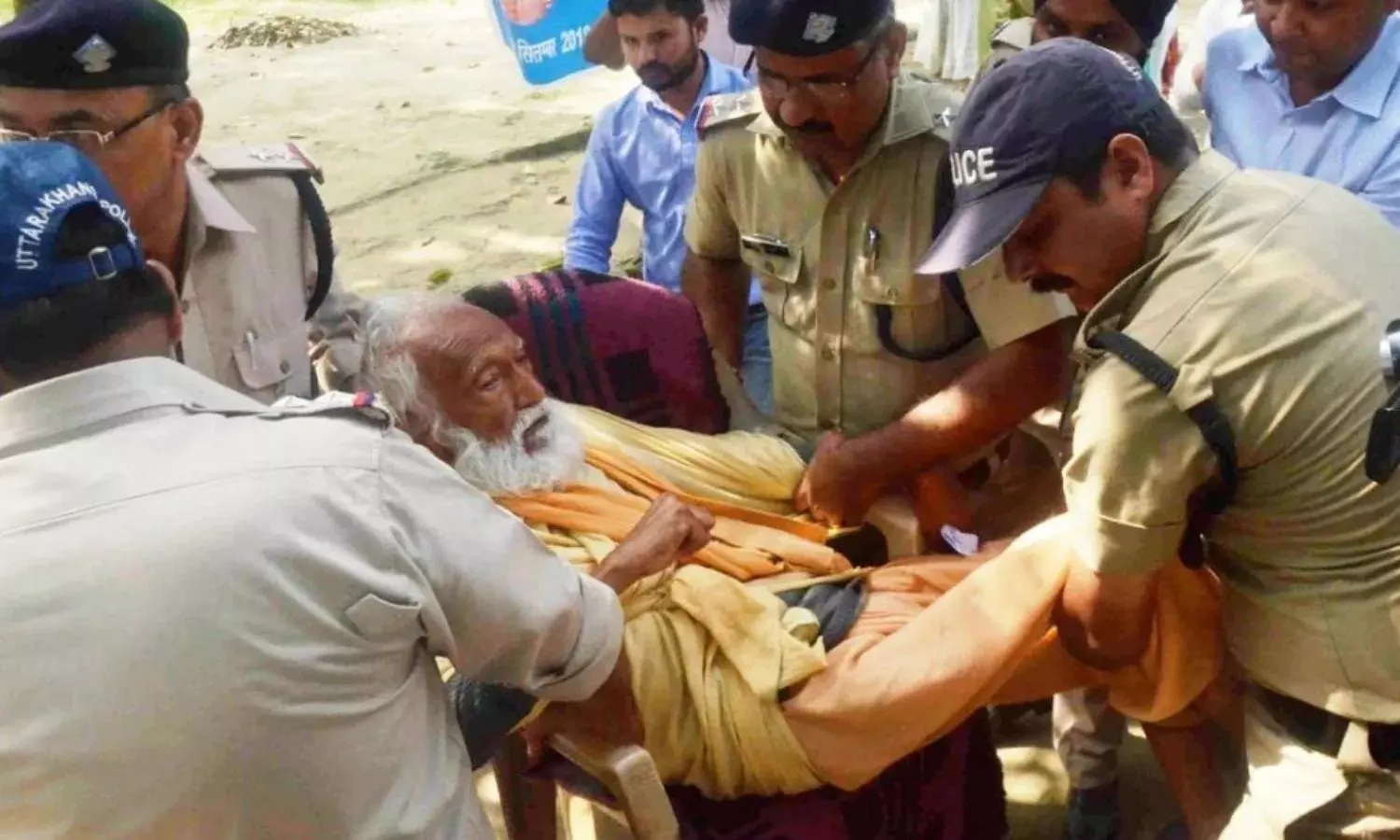Fasting Saints Could Become a Curse for Hindutva Politics
Consumer-driven development policies view rivers merely as resources to be exploited

Guru Das Agrawal, former professor at the Indian Institute of Technology in Kanpur, who became an ascetic in 2011 at the age of 79 and came to be known as Swami Gyan Swaroop Sanand, died on October 11 on the 112th day of his fast demanding a law for the conservation of the river Ganga.
Sant Gopal Das, a 40-year-old Jain saint who has fasted earlier for the release of encroached upon grazing land for cows in Haryana, inspired by Professor Agrawal also sat on fast in the Ganga's cause two days after Professor Agrawal began his fast, on June 24 at the Badri Dham temple in Badrinath. At present he is in the intensive care unit of the AIIMS in New Delhi.
26-year-old Brahmachari Atmabodhanand began his fast on October 24 as a sequel to Professor Agrawal's at Matre Sadan, which Professor Agrawal too had chosen as the site of his fast.
Even while Professor Agrawal was alive, and was visited by persons belonging to the Rashtriya Swayamsewak Sangh, the ideological parent of the Bharatiya Janata Party which is in power in both Delhi and Dehradun, the head of Matre Sadan Swami Shivanand warned them that if anything should happen to Swami Sanand then he and his disciples would continue the unfinished task undertaken by Professor Agrawal.
Professor Agrawal's was the 59th fast by a saint associated with Matre Sadan, and Atmabodhanand's is the 60th. Swami Punyanand of Matre Sadan, aged 62, gave up food grains and has been on a fruit diet since Atmabodhanand began his fast, and is prepared to shift to a water diet in the event of Atmabodhanand becoming a casualty.
Earlier, Swami Nigamanand, then 35 years of age and also associated with Matre Sadan, died on the 115th day of his fast in 2011 in a government hospital in Haridwar, demanding a curb on mining in the Ganga, which Matre Sadan considers to be murder by the mining mafia then associated with the ruling BJP in Uttarakhand.
Swami Gokulanand, who fasted with Swami Nigamanand from March 4 to 16, 1998, a year after Matre Sadan was established, is believed to have been murdered by mining mafia in 2003, when he was living in anonymity at the Bamaneshwar temple in Nainital.
Baba Nagnath died at Manikarnika Ghat in Varanasi in 2014, fasting for the same demand as of Professor Agrawal, to let the Ganga flow uninhibited and unpolluted, aviral and nirmal.
Both Swami Shivanand and Brahmachari Atmabodhanand in separate letters to the prime minister quoted the Srimadbhagwat, to say that when Ganga becomes polluted with sins it will be the duty of saints to rid her of these by sacrificing their lives. But they have not remained content to consider it their duty to fast for Ganga as a religious exercise. They have chosen to criticise the government, its ministers, policies and also its attitude. Both saints accused the prime minister of adopting consumerism-driven development policies which view Ganga as merely a water resource to be exploited for profits.
They have reserved their harshest criticism for Minister of Water Resources, River Basin Development and Ganga Rejuvenation Nitin Gadkari, whose capacity for appreciating Ganga's dignity has been doubted by Swami Shivanand. Atmabodhanand has condemned Gadkari for having lied just before Professor Agrawal's death that his demands had been met.
Both saints have been especially critical of the corporatisation of water, by the bottled water industry and the marketing of 'holy Gangajal'. Swami Shivanand has come down heavily on Modi for his love for foreign sojourns and attempts to make the cultural city of Varanasi into Kyoto. Atmabodhanand thinks this government is 'nationalist' only in name, and has otherwise a western view of development. He has demanded from PM Modi immediate compliance with two of the four demands raised by Professor Agrawal: the halting of ongoing and proposed hydroelectric projects on Ganga, and a ban on any mining in it, as an expression of homage to Professor Agrawal on behalf of the country.
Atmabodhanand has criticised the government for treating Professor Agrawal's fast as 'one man's intransigence'. He says Professor Agrawal represented the pain felt by many who consider the condition of Ganga, the state of the planet's environment, immoral development policies promoting crime and corruption, and irrational man bent upon destroying all living beings, environment and the culture of co-existence.
He feels it is from the arrogance of power that the government refuses to recognise Professor Agrawal as a representative of this pain, felt by what he describes as 'the tradition of saints willing to sacrifice themselves for the sake of Ganga'.
As the number of saints dying while fasting for Ganga's sake keeps piling up, and the resolve of more of them to embark on the same path strengthens, it may be difficult for the country and its government to ignore this phenomenon. The BJP, now busy raking up the Ram temple issue in Ayodhya and the Sabrimala issue in Kerala, ignores the issue of Ganga at its own peril.
People haven't forgotten the prime minister's claim that he got a call from Mother Ganga to contest the last parliamentary election from Varanasi. There is in place a high profile, high budget Namami Gange project aimed at cleaning Ganga which seems to have achieved little. Ganga has only become more polluted, as much water has flowed through it since Narendra Modi won his election from Varanasi. In fact, the issue of Ganga could become Narendra Modi's and the BJP's Achilles heel in the 2019 general elections.



